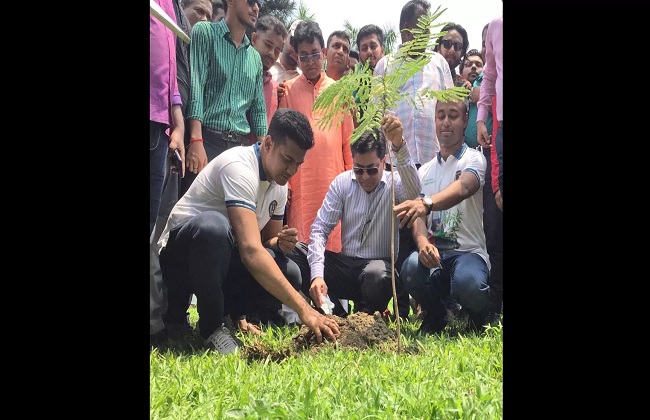
More than 25 percent area of DSCC will be brought under afforestation, said Dhaka South City Corporation (DSCC) Mayor Barrister Sheikh Fazle Noor Taposh said on Thursday.
“And Dhaka South City Corporation will stand first to achieve the target of 25 percent afforestation announced by Prime Minister Sheikh Hasina,” he said.
He said these at the opening ceremony of the ‘Tree Plantation and Sapling Distribution Programme’ organised by Dhaka Metropolitan South Chhatra League on Nagar Bhaban premises Thursday morning.
Taposh said, “Our afforestation was below 10 percent. It has now reached 17 percent through implementation of Prime Minister Sheikh Hasina’s announcement,. But to combat the effects of climate change, she directed us to increase our afforestation from 17 to 25pc.”
At that time, he expressed his optimism to achieve the target through their ongoing projects and activities and with the united efforts of Dhaka Metropolitan South Chhatra League.
He also urged the leaders of Mahanagar South Chhatra League to plant trees in Osmani Udyan and Panthkunj Udyan and on both sides of Adi Buriganga Channel, Shyampur, Jirani, Manda and Khalunagar Canal.
He distributed saplings among the student affairs secretary of Metropolitan South Chhatra League and Khilgaon Model College Chhatra League unit.
Later, he planted a sapling of Krishna on the premises of Nagar Bhaban.
At that time, Metropolitan South Chhatra League announced that they would plant 2 lakh trees in the Dhaka South City Corporation area.
Rising temperature is now perceived as an existential threat to humans. In recent years, heatwaves in European countries such as Greece, Italy, Spain, France, and the UK have resulted in numerous deaths and wildfires. In Bangladesh, we experienced extreme heat last year, leading the government to shut down primary schools as temperatures surged over 40°C in June. According to the Bangladesh Meteorological Department, the temperature broke a 58-year record in Dhaka city.
With heatwaves becoming more frequent and prolonged, there will be more severe impacts in cities like Dhaka where buildings are densely packed together and the number of trees and amount of greenery are dwindling.
Although the rising temperature has a global effect on liveability and poses threats to species worldwide, the impact of temperature increase in urban areas is likely to be magnified multiple times compared to other areas, due to the Urban Heat Island (UHI) effect a phenomenon characterised by higher temperatures in cities compared to surrounding rural areas.
